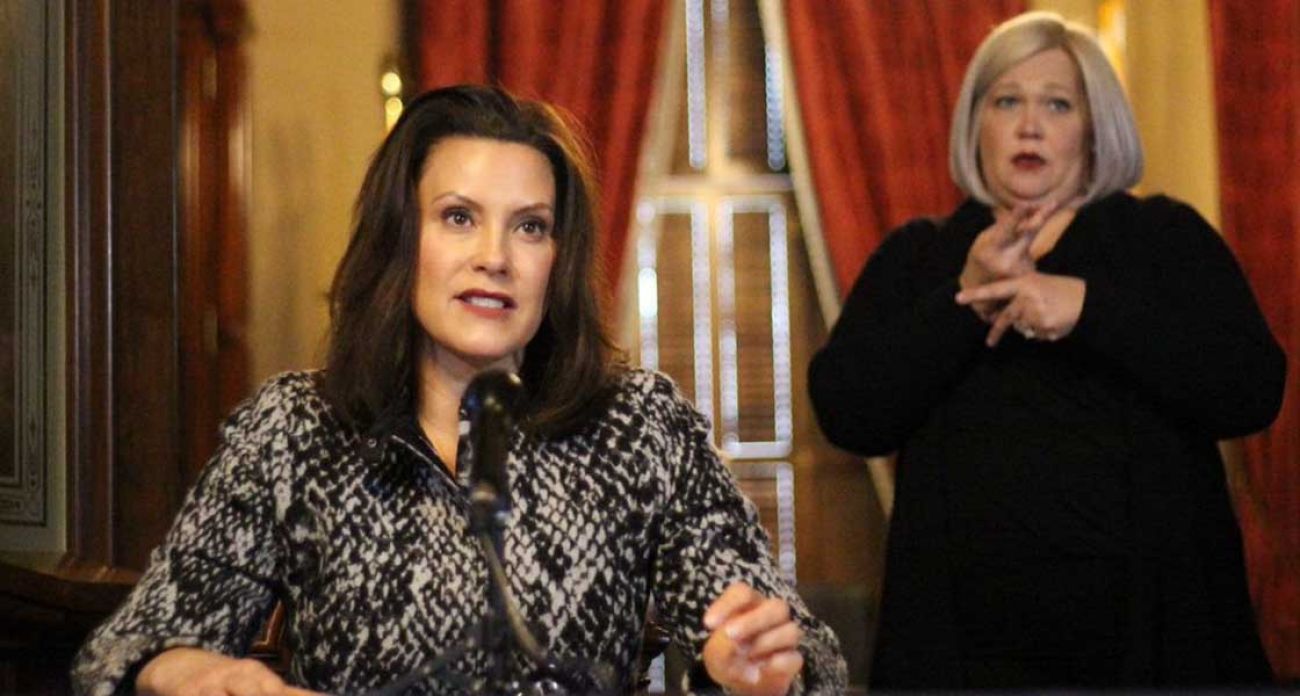Michigan Gov. Gretchen Whitmer wants to extend stay-home order past May 1

April 24 update: Gov. Gretchen Whitmer expected to extend stay-home order until May 15
LANSING — Michigan Gov. Gretchen Whitmer said Wednesday she wants to extend her stay-at-home order beyond May 1 as her administration begins restarting an economy that has been on lockdown the past month to slow the spread of the deadly coronavirus.
An extension without significant modifications could be opposed by legislative Republicans, who have lobbied the Democratic governor to relax business rules in certain sectors or regions of the state with fewer confirmed COVID-19 cases.
Whitmer and a team of advisers are developing a plan to begin reopening the economy she is expected to discuss Friday. But in a media address from Lansing, the first-term governor appeared to try and lower expectations of an immediate transition.
“I want to be clear, we will likely need another short-term extension of the stay home, stay safe order,” Whitmer said.
- The latest: Michigan coronavirus map, locations, updated COVID-19 news
- Inside Michigan Gov. Whitmer’s coronavirus fight: ‘We know we saved lives'
- Can you buy seeds in Michigan? Confusion reigns over Whitmer stay-home order.
- When Michigan unemployment, stimulus checks, and $600 CARES money will arrive
“When we do start to re-engage, it will have to be very thoughtful and precise, mitigating risk to all and mitigating the risk of a second wave. But we will start to re-engage.”
Whitmer said the state is seeing encouraging signs after recording 34,000 positive cases of coronavirus and more than 2,800 deaths. But she warned that reopening Michigan too soon could prompt a second wave of infections and said the state must continue ramping up testing.
“We see these signs and know that perhaps we can start to take some small steps forward,” Whitmer said, indicating it is “an appropriate time to reassess the breadth” of her current order. “It will be in waves. There will be some form of a stay-at-home order in effect for a long time here.”
Gideon D’Assandro, spokesperson for Speaker of the House Lee Chatfield, R-Levering, said “the focus right now” is working with Whitmer on the House-proposed plan to reopen businesses in certain counties with lower rates of infection, “especially the most updated federal safety guidelines, a regional approach, and much-needed fairness for Main Street small businesses who are not allowed to sell items at curbside or for delivery that big box stores and online retailers currently can.”
A spokesperson for Senate Republicans did not immediately respond to a request for comment.
It’s unclear what would happen if Whitmer sought to extend her stay-home order but was opposed by lawmakers. Republicans contend she cannot continue to act unilaterally if they do not extend her emergency authority beyond the end of April. Legislators last extended her emergency declaration — which is separate from her stay-home order — on April 7.
Speaking with Bridge Magazine earlier Wednesday, Senate Appropriations Chair Jim Stamas said he now would “not be in support” of extending Whitmer’s emergency authority beyond April 30.
The Midland Republican, who owns a pizza restaurant, said he’s “anxious” to hear more from the governor about her plans to re-open the economy. That will “certainly make a difference” in the ongoing debate over a legislative extension, he said.
Whitmer argues she derives her emergency authority from two separate laws: The Emergency Management Act of 1976, which requires a legislative extension every 28 days, and The Emergency Powers of Governor Act of 1945, which does require any legislative action for continuance.
“My powers come from a couple different parts of statute, and so I believe that regardless of what the Legislature does, I still retain those powers,” the governor said Monday in a separate briefing. “But I would like for them to be partners in this.”
There are significant differences between the two emergency power laws, Whitmer said Monday. In particular, the 1976 statute, which requires legislative sign off, shields health care professionals from legal liability for services provided at the request of the state.
That’s an important protection for “frontline” workers battling the pandemic at crowded Metro Detroit hospitals, the governor told reporters, and one that can't continue without legislative sign off.
“We’re trying to draw more people into the frontline, so we’ve made it easier for people to join up and we’ve given them protections for doing that — for doing their job,” she said. “So staying in a state of emergency simply so that our health care frontline workers have the protections that they need is absolutely essential.”
If the Legislature decides not to extend the emergency declaration under the 1976 law, Whitmer wouldn’t have to do anything else to extend the stay-home order, said Peter Ruddell, a lawyer at Honigman law firm and a former aide to GOP Senate Majority Leader Dan DeGrow.
“Both laws give the governor incredibly broad powers” to take action under a declaration of disaster or emergency, he said, so Republicans would have little luck arguing in court that she needs their approval.
However, Republicans may be able to argue that she overextended her powers under the emergency declarations by broadening the scope to address the “health, economic, and social harms” of the emergency, Ruddell said. “Such a declaration of emergency could arguably be beyond the police powers of the state.”
Both sides may prefer to negotiate and stick with the 1975 law to protect first responders. But if it goes to court, Ruddell said, “this is untested. We’ve never had a separation of powers issue in this state that has reached litigation of this magnitude.”
Michigan House Republicans released their own recommendations for Whitmer on Monday morning, proposing what they called a “risk-based, regional approach” to relax travel rules across the state but maintain stricter standards in counties with higher case numbers like Wayne, Oakland and Macomb.
Under current rules, “even residents who work alone in areas of the state with very low occurrences of COVID-19 are precluded from earning a paycheck or participating in perfectly safe outdoor activities, causing everything from confusion and frustration to unnecessary job loss and hardship,” Chatfield said Monday.
The House Republican plan envisions a three-phase process for “returning to a new normal,” but legislative leaders did not set a clear timeline for how long that might take.
Under a separate Senate GOP plan, sports arenas and concert venues that attract large crowds could not open to the public until there is no active spread of the coronavirus for 30 days or until a vaccine has been available for 30 days, which likely won’t happen soon.
Whitmer, who has said there are “some good ideas” in those plans, is developing her own framework with advice from an “economic recovery council” co-chaired by DTE Energy Chairman Gerry Anderson and former Henry Ford Health System CEO Nancy Schlichting.
Other health care advisers include Beaumont Health President and CEO John Fox, Henry Ford Health System President, CEO Wright Lassiter III, Munson Healthcare President and CEO Ed Ness and Brian Peters, CEO of the Michigan Health and Hospitals Association.
On the business side, Whitmer’s advisory team includes General Motors Chairman and CEO Mary Barra, Dow CEO Jim Fitterling, Steelcase President and CEO Jim Keane and Meijer CEO Rick Keyes, along with labor leaders like AFL-CIO President Ron Bieber and UAW President Rory Gamble.
RESOURCES:
- Hey, Michigan, here’s how to make a face mask to fight coronavirus
- Michigan coronavirus dashboard: cases, deaths and maps
- Michigan families can get food, cash, internet during coronavirus crisis
- How to give blood in Michigan during the coronavirus crisis
- 10 ways you can help Michigan hospital workers right now
- Michigan coronavirus Q&A: Reader questions answered
- How to apply for Michigan unemployment benefits amid coronavirus crisis
See what new members are saying about why they donated to Bridge Michigan:
- “In order for this information to be accurate and unbiased it must be underwritten by its readers, not by special interests.” - Larry S.
- “Not many other media sources report on the topics Bridge does.” - Susan B.
- “Your journalism is outstanding and rare these days.” - Mark S.
If you want to ensure the future of nonpartisan, nonprofit Michigan journalism, please become a member today. You, too, will be asked why you donated and maybe we'll feature your quote next time!




